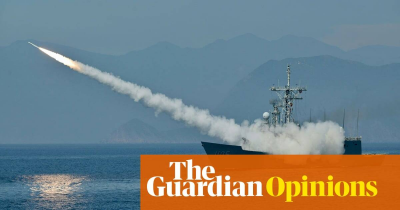The Guardian - China-China and the US are playing nice for now but flashpoints remain They must agree to peace Bob Carr and Gareth Evans
January 30, 2024 4 min 846 words
这篇报道指出,当前亚太地区的紧张氛围相对缓解,中美、中澳之间的对话重新展开。然而,评论呼吁澳大利亚等国警惕最坏情况,即存在根本风险的战争。指出美中战略竞争仍然存在,各方应共同努力确保和平,强调需要明确且实质性的承诺,使两国在全球和地区都能和平共处,相互尊重。文章提到了过去美苏之间的和缓时期,呼吁中美进入一场全面新的和缓,共同努力解决全球和地区问题。评论认为,澳大利亚作为地区中的一支中等国力,应保持独立判断,发挥积极作用。总体而言,文章强调通过克制、平衡、外交和对话实现合作,而非对抗,是实现持久和平与繁荣的关键。这一观点有助于鼓励理性声音,推动双方朝着和解的方向努力。
The environment in the Asia-Pacific is less alarming than it was a year ago. Washington and Beijing are talking again. So are Canberra and Beijing.
The United States is focused, externally, on the Middle East and the Russia-Ukraine war and, internally, on this year’s presidential election. China is preoccupied with stabilising and energising its domestic economy.
For now Beijing has largely silenced its diplomatic wolf warriors, Washington has been less accusatory and neither side seems in the mood to escalate tensions – over Taiwan, trade or anything else.
But none of this is cause for complacency, in Australia or anywhere else in our neighbourhood. US-China strategic competition remains very real, with Washington unwilling to acknowledge any limits to its longstanding global and regional primacy.
Beijing is manifestly determined to challenge that primacy, backing its rhetoric with a very significant expansion and modernisation of its military – including nuclear – capability. Taiwan, the South China Sea and the Korean peninsula continue to be dangerous potential flashpoints.
The unhappy reality is that nations can sleepwalk into war, even when rational, objective self-interest on all sides cries out against it.
Bellicose nationalist rhetoric, designed mainly for domestic political consumption, can generate overreactions elsewhere. Small provocations can generate an escalating cycle of larger reactions. Precautionary defence spending can escalate into a full-blown arms race. With more nervous fingers on more triggers, small incidents can escalate into major crises.
And major crises can explode into all-out war – creating, in this nuclear age, existential risks not only for its participants but life on this planet as we know it.
All this means that the time is ripe for reinforcing and consolidating the recent gains to ensure that they are not just fleeting and transitory. What is needed is an overt commitment from both the US and China – not just rhetorically – to living cooperatively, together, both regionally and globally, in an environment where both sides respect each other as equals and neither claims to be the undisputed top dog.
Such an accommodation is not the stuff of fantasy. We have been there before. The detente between the US and the Soviet Union, negotiated by Richard Nixon and Leonid Brezhnev, lasted through the 1970s. It delivered major arms control treaties and the Helsinki accords.
This was renewed by Ronald Reagan and Mikhail Gorbachev in the 1980s. It’s the approach to superpower coexistence always championed by the late Henry Kissinger, in what remains the most admirable and untarnished part of his legacy, and which he was clearly pursuing in his well publicised last visit to China in July 2023.
So we, and our fellow 50 Australian signatories, believe that it is time for the US and China to enter into a comprehensive new detente, formally pledging to treat each other as mutually respectful equals, to resolve differences peacefully and to work together to advance global and regional goods like nuclear arms control, the mitigation of global warming, counter-terrorism and cyber-regulation.
Australia is not condemned to being a bit-player in this enterprise. We are at most, like nearly all our regional neighbours, a middle power, but one that has enjoyed in the past a reputation as an energetic, creative and effective diplomatic actor, offering constructive solutions to the resolution of complex international problems.
Our voice in this respect will be best heard, as it has been in the past, if we maintain a fierce sovereign independence in our decision-making, not allowing either our alliance relationship with the US or our enormous economic dependence on China to cloud our judgment about what is in our own and everyone else’s best interests.
To be seen as either side’s patsy is to condemn us to diplomatic impotence and irrelevance.
None of this means that Australia or anyone else should be oblivious to the possibility of worst-case scenarios. We and our fellow signatories acknowledge that it is every state’s right and responsibility to build the kind of defence capability, and partnerships, that will enable it to meet such contingencies.
Supporting detente and doing everything within our power to bring it about does not mean appeasement, pacifism or mindless optimism. What it does mean is recognising that lasting peace is always best achieved with others, rather than against them.
Achieving the kind of mindset change that will enable both sides to embrace the spirit and substance of detente will of course not be easy: continued primacy is an article of political faith in the US, and China will not find it easy to step back on the South China Sea, let alone Taiwan.
But quieter voices in both countries, and there are plenty of them, do recognise that the path to sustainable peace and prosperity lies not in confrontation but cooperation, achieved through restraint and balance, diplomacy and dialogue.
And it is those voices which Australia should be encouraging, who we are capable of influencing and to whom our statement is directed.
Bob Carr is a former Australian foreign affairs minister and longest-serving premier of New South Wales
Gareth Evans was Australia’s foreign minister from 1988 to 1996

